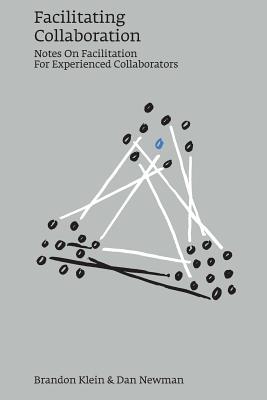Facilitating Collaboration: Notes on Facilitation for Experienced Collaborators

Facilitating Collaboration: Notes on Facilitation for Experienced Collaborators
Combining nearly two decades of facilitating organizational transformations and workshop/meeting strategies for Fortune 25 companies, international governments and non-profit institutions, Brandon and Dan share the steps and critical approach to help you evolve from traditional facilitation to advanced collaboration. Learn directly from successful conversions at Google (the start of Google Apps) and the Arab League (22 country collaboration) as well as a regional non-profit (improving diversity) and local school (transformations). This book is not a toolkit or step by step guide, but rather you should already be an experienced collaborator and facilitator. You will learn directly The Facilitator's 6 Jobs: Scoping Understanding what the client wants. Scoping an event involves clarifying what outcomes the client is seeking, how these outcomes will be put to use to achieve broader objectives, what decisions have already been taken, and what topics will not be addressed. (see Chapter 3) Working with Sponsors Building a trusting relationship with the sponsors about content. Event sponsors will only trust an outside facilitator to shape critical work with a large team if he or she invests the time and care to understand the business issue at hand and the personal and political challenges faced by sponsors. (see Chapter 4) Preparation Assembling the elements - some tangible, most not - that need to be in place in order to deliver an event. Logistics and knowledge inputs account for the bulk of the tangible preparation. The intangibles consist of deep learning about the client's issues and the elements from which possible solutions will be constructed. (see Chapter 5) Of course, preparation includes agenda design, which is addressed separately in the subsequent chapter. Designing The process of building an agenda. I intentionally choose event modules and order them to achieve specific intermediate outcomes and to create a narrative of the event. The focus is on the process of involving clients in the design process rather than on the design per se. (see Chapter 6) Delivery Guiding a group of participants through designed work towards a desired outcome. This is what people tend to think of when I say facilitation: standing in front of a room full of people, moderating discussion, directing work, telling stories, listening, and generally waving my arms about in the hope of orchestrating the work of a group assembled for a common purpose. (see Chapter 7) Value Ca
Descrierea produsului
Combining nearly two decades of facilitating organizational transformations and workshop/meeting strategies for Fortune 25 companies, international governments and non-profit institutions, Brandon and Dan share the steps and critical approach to help you evolve from traditional facilitation to advanced collaboration. Learn directly from successful conversions at Google (the start of Google Apps) and the Arab League (22 country collaboration) as well as a regional non-profit (improving diversity) and local school (transformations). This book is not a toolkit or step by step guide, but rather you should already be an experienced collaborator and facilitator. You will learn directly The Facilitator's 6 Jobs: Scoping Understanding what the client wants. Scoping an event involves clarifying what outcomes the client is seeking, how these outcomes will be put to use to achieve broader objectives, what decisions have already been taken, and what topics will not be addressed. (see Chapter 3) Working with Sponsors Building a trusting relationship with the sponsors about content. Event sponsors will only trust an outside facilitator to shape critical work with a large team if he or she invests the time and care to understand the business issue at hand and the personal and political challenges faced by sponsors. (see Chapter 4) Preparation Assembling the elements - some tangible, most not - that need to be in place in order to deliver an event. Logistics and knowledge inputs account for the bulk of the tangible preparation. The intangibles consist of deep learning about the client's issues and the elements from which possible solutions will be constructed. (see Chapter 5) Of course, preparation includes agenda design, which is addressed separately in the subsequent chapter. Designing The process of building an agenda. I intentionally choose event modules and order them to achieve specific intermediate outcomes and to create a narrative of the event. The focus is on the process of involving clients in the design process rather than on the design per se. (see Chapter 6) Delivery Guiding a group of participants through designed work towards a desired outcome. This is what people tend to think of when I say facilitation: standing in front of a room full of people, moderating discussion, directing work, telling stories, listening, and generally waving my arms about in the hope of orchestrating the work of a group assembled for a common purpose. (see Chapter 7) Value Ca
Detaliile produsului












